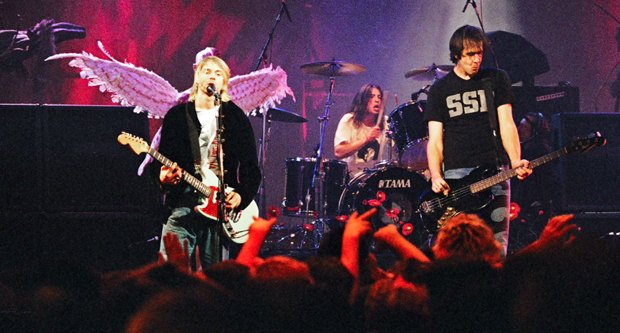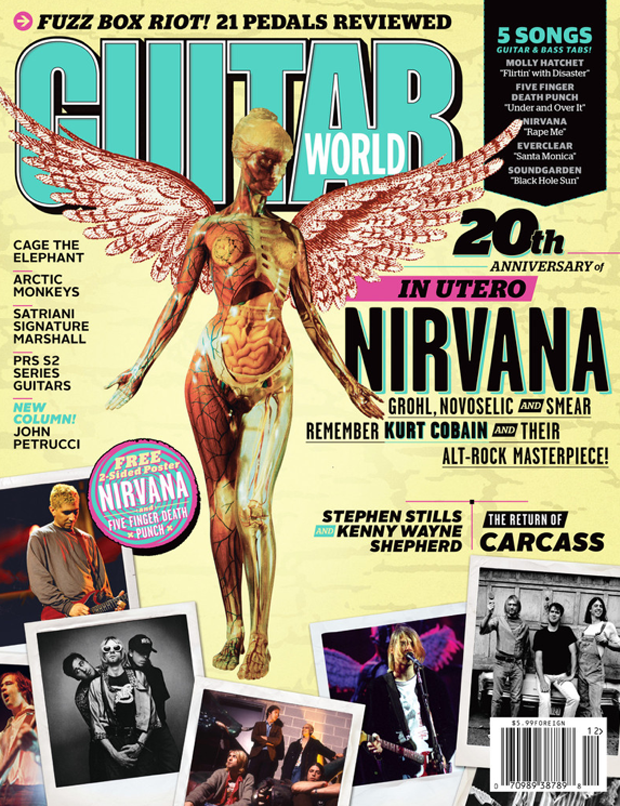Dave Grohl, Krist Novoselic and Pat Smear Reflect on the Making of Nirvana's 'In Utero'
All the latest guitar news, interviews, lessons, reviews, deals and more, direct to your inbox!
You are now subscribed
Your newsletter sign-up was successful

This is an excerpt from the December 2013 issue of Guitar World. For the rest of this story (plus two more Nirvana features) and more — including Carcass, Chris Broderick, Cage the Elephant, a fuzz box roundup and John Petrucci's new column — check out the December 2013 issue at the Guitar World Online Store.
Twenty years after Kurt Cobain suffered for the sins of corporate rock, Nirvana rise from the vault in a deluxe box-set reissue of theor great grunge apotheosis, In Utero. Guitar World delivers the gospel according to Dave Grohl, Krist Novoselic and Pat Smear.
“It’s the most honest record I’ve ever made in my entire life,” Dave Grohl says of In Utero, Nirvana’s 1993 swansong.
It’s quite a statement coming from a guy who has amassed a deep catalog of bone-crunching, gut-level rock with the Foo Fighters and Them Crooked Vultures, not to mention a musician who has performed and recorded with everyone from Paul McCartney and David Bowie to Stevie Nicks and John Fogerty.
But Grohl’s 1990–1994 tenure in Nirvana is especially close to his heart. Nirvana was the band that changed Grohl’s life, catapulting him from hardcore punk obscurity to worldwide fame as the drummer for a group that was perhaps the most influential band of the alternative-rock Nineties. Which is to say that Nirvana changed a lot of lives.
In Utero resonates with many of the band’s fans in a particularly poignant way. Just six months after the album’s release, Nirvana frontman Kurt Cobain was dead by his own hand at age 27, leaving In Utero’s songs as a kind of final statement—and in some cases a final pained outcry—from one of the most beloved and troubled songwriters in recent rock history.
To honor the 20th anniversary of In Utero’s release, Universal Music is releasing a massive box-set reissue. The set’s most deluxe format features the original album remastered, plus a brand-new remix of the entire disc by In Utero’s original producer, alt-rock studio legend Steve Albini. It also include B-sides, demo recordings, previously unreleased tracks, photos, documents and rarities galore, plus both audio and video discs of Nirvana’s December 13, 1993, Live and Loud concert, originally recorded for a New Year’s Eve broadcast on MTV.
All the latest guitar news, interviews, lessons, reviews, deals and more, direct to your inbox!
“There’s a song on In Utero called ‘Milk It,’ and that’s what we’re doing,” deadpans Nirvana bassist Krist Novoselic. “So that’s Kurt Cobain’s prophetic message about the future of Nirvana. We figured out how to sell records in the digital era: find never-seen-before photographs, print them on high-quality paper, find old chestnuts in the bottom of the drawer—outtakes, whatever. You put in a video, and you’ve got this package that you can sell the old-fashioned way, over the counter.
“But really, I’m just being cynical. There’s some good material in the box set. And there are a lot of real fans who collect the bootlegs, concerts and photographs. They really appreciate these types of releases. So this is for them.”
In Utero is inextricably associated with Cobain’s death in the minds of many. Some of the lyrics read like a suicide note from Nirvana’s leader, who was in and out of heroin addiction at the time and severely depressed. In Utero’s lyrics rage, weep and wail with emotions that range from Cobain’s ambivalence toward his and Courtney Love’s marriage to his guilt and anxiety that he’d sold out his indie punk ideals by becoming one of the world’s biggest rock stars.
Novoselic and Grohl play these tortured songs with a ferocious sense of urgency that befits Cobain’s primordial howl and the fierce/tender dynamics of his stressed-out guitar gear. One of the tentative titles for the album was I Hate Myself and Want to Die.
But for all its grunge-era gloom and portents of mortality, In Utero is also—ironically enough—an album deeply involved in rebirth. Images of fertility, pregnancy and embryonic life loom large in the album’s lyrics and cover art. It’s almost like Cobain is already looking ahead to his next incarnation. This uneasy stance between life and death is one key to the album’s enduring emotional resonance. And at the time it was made,
In Utero really did represent a rebirth of sorts for Nirvana, a band that had almost been blown apart by the unexpected mass popularity of their previous album and major label debut, 1991’s Nevermind.
“You have to understand that when Nevermind became popular, it was kind of a traumatic experience for the band,” Grohl says. “We stopped everything and just went into hiding, because we weren’t really built to withstand that kind of success. When Nevermind was selling millions of copies, we were still touring in a fucking van, you know? We were still sharing hotel rooms and sleeping in the back rooms of friends’ houses. We just weren’t prepared for what happened.”
Photo: Jeff Kravitz/FilmMagic, Inc./Getty Images
For the rest of this story (plus two more Nirvana features) and more — including Carcass, Chris Broderick, Cage the Elephant, a fuzz box roundup and John Petrucci's new column — check out the December 2013 issue at the Guitar World Online Store.

In a career that spans five decades, Alan di Perna has written for pretty much every magazine in the world with the word “guitar” in its title, as well as other prestigious outlets such as Rolling Stone, Billboard, Creem, Player, Classic Rock, Musician, Future Music, Keyboard, grammy.com and reverb.com. He is author of Guitar Masters: Intimate Portraits, Green Day: The Ultimate Unauthorized History and co-author of Play It Loud: An Epic History of the Sound Style and Revolution of the Electric Guitar. The latter became the inspiration for the Metropolitan Museum of Art/Rock and Roll Hall of Fame exhibition “Play It Loud: Instruments of Rock and Roll.” As a professional guitarist/keyboardist/multi-instrumentalist, Alan has worked with recording artists Brianna Lea Pruett, Fawn Wood, Brenda McMorrow, Sat Kartar and Shox Lumania.

